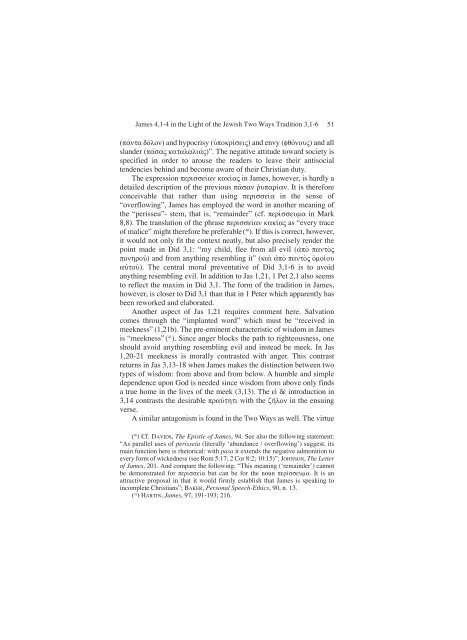James 4,1-4 in the Light of the Jewish Two Ways Tradition 3,1-6
James 4,1-4 in the Light of the Jewish Two Ways Tradition 3,1-6
James 4,1-4 in the Light of the Jewish Two Ways Tradition 3,1-6
You also want an ePaper? Increase the reach of your titles
YUMPU automatically turns print PDFs into web optimized ePapers that Google loves.
<strong>James</strong> 4,1-4 <strong>in</strong> <strong>the</strong> <strong>Light</strong> <strong>of</strong> <strong>the</strong> <strong>Jewish</strong> <strong>Two</strong> <strong>Ways</strong> <strong>Tradition</strong> 3,1-6 51<br />
(pavnta dovlon) and hypocrisy (uJpokrivsei") and envy (fqovnou") and all<br />
slander (pavsa" katalaliav")”. The negative attitude toward society is<br />
specified <strong>in</strong> order to arouse <strong>the</strong> readers to leave <strong>the</strong>ir antisocial<br />
tendencies beh<strong>in</strong>d and become aware <strong>of</strong> <strong>the</strong>ir Christian duty.<br />
The expression perisseivan kakiva" <strong>in</strong> <strong>James</strong>, however, is hardly a<br />
detailed description <strong>of</strong> <strong>the</strong> previous pa'san rJuparivan. It is <strong>the</strong>refore<br />
conceivable that ra<strong>the</strong>r than us<strong>in</strong>g perisseiva <strong>in</strong> <strong>the</strong> sense <strong>of</strong><br />
“overflow<strong>in</strong>g”, <strong>James</strong> has employed <strong>the</strong> word <strong>in</strong> ano<strong>the</strong>r mean<strong>in</strong>g <strong>of</strong><br />
<strong>the</strong> “perisseu”- stem, that is, “rema<strong>in</strong>der” (cf. perivsseuma <strong>in</strong> Mark<br />
8,8). The translation <strong>of</strong> <strong>the</strong> phrase perisseivan kakiva" as “every trace<br />
<strong>of</strong> malice” might <strong>the</strong>refore be preferable( 40 ). If this is correct, however,<br />
it would not only fit <strong>the</strong> context neatly, but also precisely render <strong>the</strong><br />
po<strong>in</strong>t made <strong>in</strong> Did 3,1: “my child, flee from all evil (ajpo; panto;"<br />
ponhrou') and from anyth<strong>in</strong>g resembl<strong>in</strong>g it” (kai; ajpo; panto;" oJmoivou<br />
aujtou'). The central moral preventative <strong>of</strong> Did 3,1-6 is to avoid<br />
anyth<strong>in</strong>g resembl<strong>in</strong>g evil. In addition to Jas 1,21, 1 Pet 2,1 also seems<br />
to reflect <strong>the</strong> maxim <strong>in</strong> Did 3,1. The form <strong>of</strong> <strong>the</strong> tradition <strong>in</strong> <strong>James</strong>,<br />
however, is closer to Did 3,1 than that <strong>in</strong> 1 Peter which apparently has<br />
been reworked and elaborated.<br />
Ano<strong>the</strong>r aspect <strong>of</strong> Jas 1,21 requires comment here. Salvation<br />
comes through <strong>the</strong> “implanted word” which must be “received <strong>in</strong><br />
meekness” (1,21b). The pre-em<strong>in</strong>ent characteristic <strong>of</strong> wisdom <strong>in</strong> <strong>James</strong><br />
is “meekness” ( 41 ). S<strong>in</strong>ce anger blocks <strong>the</strong> path to righteousness, one<br />
should avoid anyth<strong>in</strong>g resembl<strong>in</strong>g evil and <strong>in</strong>stead be meek. In Jas<br />
1,20-21 meekness is morally contrasted with anger. This contrast<br />
returns <strong>in</strong> Jas 3,13-18 when <strong>James</strong> makes <strong>the</strong> dist<strong>in</strong>ction between two<br />
types <strong>of</strong> wisdom: from above and from below. A humble and simple<br />
dependence upon God is needed s<strong>in</strong>ce wisdom from above only f<strong>in</strong>ds<br />
a true home <strong>in</strong> <strong>the</strong> lives <strong>of</strong> <strong>the</strong> meek (3,13). The eij dev <strong>in</strong>troduction <strong>in</strong><br />
3,14 contrasts <strong>the</strong> desirable prau?thti with <strong>the</strong> zh'lon <strong>in</strong> <strong>the</strong> ensu<strong>in</strong>g<br />
verse.<br />
A similar antagonism is found <strong>in</strong> <strong>the</strong> <strong>Two</strong> <strong>Ways</strong> as well. The virtue<br />
( 40 ) Cf. DAVIDS, The Epistle <strong>of</strong> <strong>James</strong>, 94. See also <strong>the</strong> follow<strong>in</strong>g statement:<br />
“As parallel uses <strong>of</strong> perisseia (literally ‘abundance / overflow<strong>in</strong>g’) suggest, its<br />
ma<strong>in</strong> function here is rhetorical: with pasa it extends <strong>the</strong> negative admonition to<br />
every form <strong>of</strong> wickedness (see Rom 5:17; 2 Cor 8:2; 10:15)”; JOHNSON, The Letter<br />
<strong>of</strong> <strong>James</strong>, 201. And compare <strong>the</strong> follow<strong>in</strong>g: “This mean<strong>in</strong>g (‘rema<strong>in</strong>der’) cannot<br />
be demonstrated for perisseiva but can be for <strong>the</strong> noun perivsseuma. It is an<br />
attractive proposal <strong>in</strong> that it would firmly establish that <strong>James</strong> is speak<strong>in</strong>g to<br />
<strong>in</strong>complete Christians”; BAKER, Personal Speech-Ethics, 90, n. 13.<br />
( 41 ) HARTIN, <strong>James</strong>, 97, 191-193; 216.


